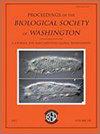Taxonomic evaluation of the three “type” specimens of the fringe-footed shrew, Sorex fimbripes Bachman, 1837 (Mammalia: Soricidae) and recommended nomenclatural status of the name
IF 0.5
4区 生物学
Q3 Agricultural and Biological Sciences
引用次数: 0
Abstract
Abstract.— John Bachman (1837:391) described the “fringe-footed shrew,” Sorex fimbripes Bachman, 1837, in his landmark monograph on the North American Soricidae (Mammalia: Eulipotyphla), in which he recognized 13 uniquely New World species. Characters he attributed to S. fimbripes resulted in its being interpreted as a tiny, semi-aquatic species and contributed to the complexity of its subsequent taxonomic history. The status and location of the holotype, which should aid in resolving questions about the nature of S. fimbripes, instead have added to the confusion. Originally studied by Bachman in South Carolina, the holotype was later thought to have been identified in the Academy of Natural Sciences of Philadelphia (ANSP), and it is currently considered to be in the National Museum of Natural History (USNM), Washington, D.C. To clarify the identity of the species and its holotype, I compared descriptions of the holotype and the ANSP type with the USNM specimen and with eight species of eastern North American shrews. I conclude that the three accounts of S. fimbripes refer to three different specimens and that the holotype was probably destroyed during the American Civil War. Bachman's S. fimbripes was most likely equivalent to S. cinereus Kerr, 1792, S. fontinalis Hollister, 1911, or S. fumeus Miller, 1895, but without the holotype, its identity cannot be determined definitively, and the name is a nomen dubium.3个棱足鼩(哺乳目:棱足鼩科)“型”标本的分类评价及推荐命名地位
摘要。——约翰·巴赫曼(John Bachman,1837:391)在其具有里程碑意义的北美金龟子科专著(哺乳动物:真脂斑疹伤寒)中描述了“边缘足鼩”,即Sorex fimbripes Bachman(1837),他在该专著中识别了13个独特的新大陆物种。他将其归因于S.fimbripes的特征导致其被解释为一个微小的半水生物种,并导致其随后分类历史的复杂性。正模标本的状态和位置本应有助于解决关于伞伞藻性质的问题,但却增加了混乱。最初由南卡罗来纳州的巴赫曼研究,该正模后来被认为在费城自然科学院(ANSP)发现,目前被认为在华盛顿特区的国家自然历史博物馆(USNM),我将正模和ANSP型的描述与USNM标本和八种北美东部鼩鼩进行了比较。我得出的结论是,三种关于伞伞藻的描述涉及三种不同的标本,该正模标本可能在美国内战期间被摧毁。Bachman的s.fimbripes很可能相当于s.cinereus Kerr,1792年,s.fontinalis Hollister,1911年,或s.fumeus Miller,1895年,但如果没有正模,它的身份就无法确定,而且这个名字是一个名词dubium。
本文章由计算机程序翻译,如有差异,请以英文原文为准。
求助全文
约1分钟内获得全文
求助全文
来源期刊
自引率
0.00%
发文量
0
审稿时长
>12 weeks
期刊介绍:
The official publication of the Biological Society of Washington, the Proceedings of the Biological Society of Washington is an international journal containing peer-reviewed papers that broadly bear on systematics in the biological sciences (botany and zoology), paleontology, and notices of business transacted at Society meetings.

 求助内容:
求助内容: 应助结果提醒方式:
应助结果提醒方式:


